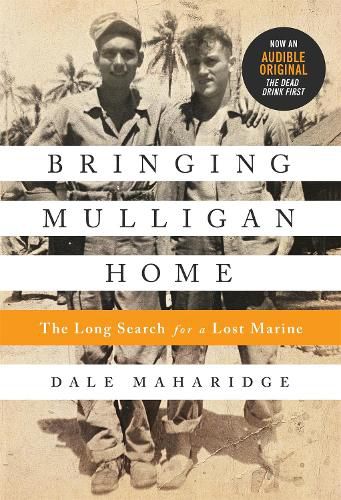Readings Newsletter
Become a Readings Member to make your shopping experience even easier.
Sign in or sign up for free!
You’re not far away from qualifying for FREE standard shipping within Australia
You’ve qualified for FREE standard shipping within Australia
The cart is loading…






Sgt. Steve Maharidge, like many of his generation, hardly ever talked about the war. The only sign of it was a single black and white photograph that he pinned to the wall of his basement, where, in his spare time, he would grind steel. The picture showed Maharidge with one of his comrades—he never said who. In front of his son, Maharidge once yelled over the sound of his steel grinders at the photograph: They said I killed him, and it wasn’t my fault! After Steve Maharidge’s death, his son Dale, an adult now, began a quest to understand his father’s outburst: What had happened during the battle for Okinawa, and why his father had remained haunted and all but silent about his experience and the unnamed man. In his quest for the soldier, Maharidge sought out the survivors of Love Company, men in their late 70s and 80s, many of whom had never before spoken so openly and emotionally about what they saw and experienced on Okinawa.
The Battle of Okinawa of World War II began in April 1945—in the following four months, an estimated 250,000 Japanese soldiers and native Okinawans would perish, as would 12,000 American soldiers. Americans called the battle Operation Iceberg, while the Japanese called it tetsu no ame, or the rain of steel.
In Bringing Mulligan Home, Maharidge delivers an affecting narrative of war and its aftermath, of fathers and sons, of the generation that survives the shell-shocked men who fought on Okinawa. In a small way, Bringing Mulligan Home fills the silence that has haunted the post-war generation. An established scholar of the American working class, Maharidge also masterfully paints a picture of the industrial working-class landscape that drove men to enlist, and the United States that awaited them upon return.
$9.00 standard shipping within Australia
FREE standard shipping within Australia for orders over $100.00
Express & International shipping calculated at checkout
Stock availability can be subject to change without notice. We recommend calling the shop or contacting our online team to check availability of low stock items. Please see our Shopping Online page for more details.
Sgt. Steve Maharidge, like many of his generation, hardly ever talked about the war. The only sign of it was a single black and white photograph that he pinned to the wall of his basement, where, in his spare time, he would grind steel. The picture showed Maharidge with one of his comrades—he never said who. In front of his son, Maharidge once yelled over the sound of his steel grinders at the photograph: They said I killed him, and it wasn’t my fault! After Steve Maharidge’s death, his son Dale, an adult now, began a quest to understand his father’s outburst: What had happened during the battle for Okinawa, and why his father had remained haunted and all but silent about his experience and the unnamed man. In his quest for the soldier, Maharidge sought out the survivors of Love Company, men in their late 70s and 80s, many of whom had never before spoken so openly and emotionally about what they saw and experienced on Okinawa.
The Battle of Okinawa of World War II began in April 1945—in the following four months, an estimated 250,000 Japanese soldiers and native Okinawans would perish, as would 12,000 American soldiers. Americans called the battle Operation Iceberg, while the Japanese called it tetsu no ame, or the rain of steel.
In Bringing Mulligan Home, Maharidge delivers an affecting narrative of war and its aftermath, of fathers and sons, of the generation that survives the shell-shocked men who fought on Okinawa. In a small way, Bringing Mulligan Home fills the silence that has haunted the post-war generation. An established scholar of the American working class, Maharidge also masterfully paints a picture of the industrial working-class landscape that drove men to enlist, and the United States that awaited them upon return.